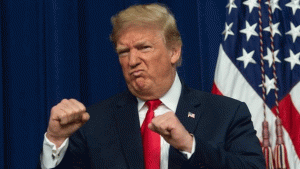
A panel of three judges at the US Court of International Trade in Manhattan issued a unanimous ruling Wednesday which sided with Democratic-led states and small businesses that accused Trump of wrongfully invoking an emergency law to justify the bulk of his levies.
The court gave the administration 10 days to “effectuate” its order, but didn’t provide any specific directions of steps it must take to unwind the tariffs.
The Justice Department filed a notice of appeal with the US Court of Appeals for the Federal Circuit. The US Supreme Court may ultimately have the final say in the high-stakes case that could impact trillions of dollars in global trade.
For now, the ruling permanently blocks the tariffs unless the appeals court allows Trump to reinstate them during litigation.
US stock futures jumped with the contracts on Nasdaq 100 Index rising as much as 2.1% on the ruling. The dollar strengthened and the yen tumbled.
The decision is one of the biggest setbacks in court for Trump amid a wave of lawsuits over executive orders testing the limits of presidential power. Others are challenging Trump’s mass firings of federal workers, restrictions on birthright citizenship and efforts to slash federal spending already approved by Congress.
The judges rejected the government’s argument that Trump had authority to unilaterally issue tariffs under a law intended to address financial transactions during national emergencies. The ruling was a so-called summary judgment, meaning a final victory for the plaintiffs in lower court without the need for a trial.
Trump’s executive orders invoked the International Emergency Economic Powers Act to justify the sweeping global tariffs. The law grants the president authority over a variety of financial transactions during certain emergencies, typically with sanctions.
The president cited the US trade deficits and drug trafficking at the US border as national emergencies that allowed him to invoke the law. The judges said Trump’s lawyers had stated during court hearings that the intention was to “pressure” other nations into striking better deals.
“The government’s ‘pressure’ argument effectively concedes that the direct effect of the country-specific tariffs is simply to burden the countries they target,” wrote the panel, which includes one judge appointed by Trump, one by Barack Obama and one by Ronald Reagan.
The order suspends the bulk of Trump’s tariffs — his global flat tariff, elevated rates on China and others, and his fentanyl-related tariffs on China, Canada and Mexico are all suspended by the ruling. Other tariffs imposed under different powers, like so-called Section 232 and Section 301 levies, are unaffected, and include the tariffs on steel, aluminum and automobiles.
A White House spokesman said “it is not for unelected judges to decide how to properly address a national emergency.”
“Foreign countries’ nonreciprocal treatment of the Unites States has fueled America’s historic and persistent trade deficits,” Kush Desai said in a statement. “These deficits have created a national emergency that has decimated American communities, left our workers behind, and weakened our defense industrial base – facts that the court did not dispute.”




I was curious if you ever thought of changing the page layout of your blog?
Its very well written; I love what youve
got to say. But maybe you could a little more in the way of content so people could
connect with it better. Youve got an awful lot of text for only
having 1 or 2 pictures. Maybe you could space it out better?
What’s up, all is going perfectly here and ofcourse every one is sharing data, that’s really excellent, keep
up writing.
Tham gia cộng đồng game thủ tại Go88 để trải nghiệm các trò chơi bài, poker phổ biến nhất hiện nay.
Tham gia cộng đồng game thủ tại Go88 để trải nghiệm các trò chơi bài, poker phổ biến nhất hiện nay.
Đến với J88, bạn sẽ được trải nghiệm dịch vụ cá cược chuyên nghiệp cùng hàng ngàn sự kiện khuyến mãi độc quyền.
搭载智能站群程序,自动化搭建与管理,为SEO项目提供核心驱动力。站群程序
苹果签名,苹果超级签平台,ios超级签平台ios超级签苹果企业签,苹果超级签,稳定超级签名
iwin – nền tảng game bài đổi thưởng uy tín, nơi bạn có thể thử vận may và tận hưởng nhiều tựa game hấp
Với giao diện mượt mà và ưu đãi hấp dẫn, MM88 là lựa chọn lý tưởng cho các tín đồ giải trí trực tuyến.
Đến với J88, bạn sẽ được trải nghiệm dịch vụ cá cược chuyên nghiệp cùng hàng ngàn sự kiện khuyến mãi độc quyền.